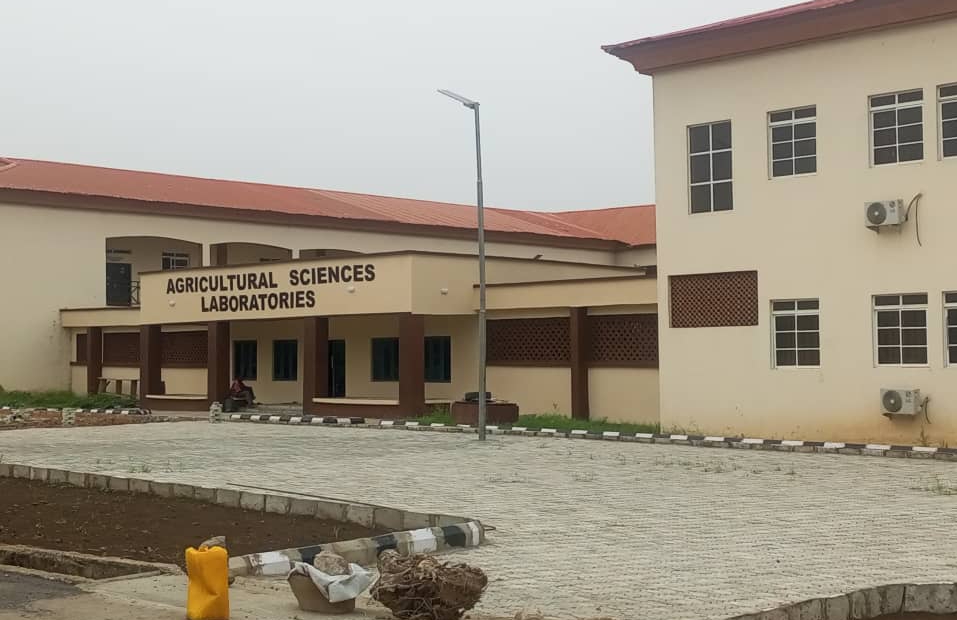All not well: LAUTECH Teaching Hospital suffers critical staff shortage arising from brain drain of doctors
Source: Businessday
Health workers at Ladoke Akintola University of Technology (LAUTECH) Teaching Hospital are facing a multitude of challenges, including gruelling workloads, stagnant salaries, and a low hazard allowance. This situation has led to a concerning exodus of staff, jeopardising the quality of care provided at the facility and leading to a situation where 70 resident doctors and 10 house officers are doing the work of 238 individuals, as BusinessDay Investigation can authoritatively report.
LAUTECH Teaching Hospital has 13 departments, comprising Medicine, Surgery, Obstetrics and Gynaecology, Radiology, Community Medicine and Family Medicine, Paediatrics, Nursing, Chemical Pathology, Histopathology, Haematology, Orthopaedics, and Psychiatry.
Advertisement
According to information on its website, the hospital has been making considerable progress with improvements in the number and quality of staff, acquiring modern equipment, and providing international standard training for medical students and resident doctors in the last 12 years.
It further stated that it has an adequate number of consultants and resident doctors to cater for its patients.
“The hospital is well-equipped with state-of-the-art facilities,” information on its website read, with its vision to become the leading tertiary healthcare institution in the West Africa sub-region, renowned for world-class training, cutting-edge research, and superior services.
“Our goal is to be the preferred destination for specialised healthcare in a welcoming environment, distinguished by a culture of continuous and compassionate care,” it stated.
However, “These long hours, coupled with a shortage of workers, have created a stressful environment.”
Long work hours
Speaking on the number of working hours, he disclosed there’s no specific number of hours stipulated for doctors to work, saying, “As a doctor, you have to take calls.”
Unlike their colleagues in other places who take one call in a week and a maximum of three calls in two weeks, he lamented the frequency of calls they take at the LAUTECH teaching hospital as one of the major challenges for them.
“They (colleagues in other hospitals) have a lot of time to themselves and everything. They are well-rested,” he added.
Rockson told this reporter he had done an alternate-day call for three consecutive months.
“At some point, some house officers got sick, which means that you work 36 hours out of every 48 hours,” he said.
These long hours, coupled with a shortage of workers, have created a stressful environment. Since Dr Rockson and his colleagues arrived, many have already left after completing their house jobs. The hospital’s attempts to replace them haven’t been successful, as potential hires are drawn to better-paying opportunities elsewhere.

“Since we resumed, people we met have started finishing their house jobs. Now the issue has been to replace those people. So, they (LAUTECH teaching hospital management) have not been replacing them.”
He added that existing workers had submitted some applications as recommendations, but the management of the hospital did not call those recommended for an interview.
“We submitted those applications. We talked to our guys about coming to LAUTECH Teaching Hospital. The hospital did not call those people for an interview. They did not give them any dates to resume. That’s not even an issue of them not seeing people apply. Now, those people have gone to other centres where they are now getting better pay,” he said.
Exhausting work schedules
Rockson explained that when one is on a weekend call, such an individual resumes work on Saturday at 8 a.m. and goes home on Monday at 4 p.m., while the break (rest period) is from Monday at 4 p.m. to Tuesday at 8 a.m..
“So, if you’re on a weekend call and you work from Saturday 8 a.m. to Monday 4 p.m., you’ve spent 56 hours at work without rest. Any patient that comes within that period, you are expected to see. No excuse. Nothing,” he said.
Amidst the busyness and working hours, Rockson disclosed that they still get abused by some of the patients.
Despite the challenges, one of the things he noticed is that the workers at the teaching hospital love their job.
“It’s just that people have a passion for the job. I still don’t see doctors here arguing with patients. They still see patients to the best of their ability.”
He told our correspondent that the average salary range he gets is N170,000 to N175,000, adding that salaries have increased in other centres, and every time they complain, they don’t get a reaction anymore.
Advertisement
When workers at the centre complained about their pay, it was at this point that the management of the hospital attempted to double how much should be paid for the quarters.
“They want to double the amount we are paying to the hospital at the same time we are crying that the salary is not being increased,” Rockson said.
The low wages at LAUTECH Teaching Hospital are another major source of discontent. While other hospitals have implemented salary increases, LAUTECH staff have seen no such improvement. This lack of financial incentive, combined with the demanding workload, has led to low morale among workers.
Dr Rockson, for instance, has had little time for personal pursuits outside of work. He disclosed that, as a sportsman who likes to have fun, since he got to Ogbomosho, he has not had time to do any of these things.
Some days, from 4 p.m. to the next morning of his rest period, he had planned to go play football, but he could not use the little time he had to rest to go play ball.
“I struggle to watch football. For three to four months in a row, I have not played ball. I have not done anything fun. I’ve not had the time to go out or do anything,” he said.
‘Our mental health is at stake’
Dr Iwalewa Tosin, a resident doctor, also referred to as a registrar, has been working in the centre for over a year.
Speaking on the welfare of the teaching hospital, he said he is still being owed a two-and-a-half month’s salary for March, April, and May 2023.
“Till now, I’m yet to be paid,” he said.
He further confirmed that the workers in the teaching hospital are not enough. Rather than having more than 200 registrars, the teaching hospital barely boasts 70. An indication that a single individual is doing the work meant for more than three to four doctors.
Tosin said the salary is nothing to write home about, and nothing has been done about it, but it has been a continuous promise.
The registrar, sharing one of the hurdles he encounters, said they work extra hard, which eventually affects their mental health.
“We improvise a lot. This is a teaching hospital without medical officers. No casualty officer would take care of an emergency,” he said.
He said the discrepancy in pay compared to other centres is too obvious, and the margin is too wide.
He confirmed the payment of N5,000 as hazard allowance.
He said there was a time when the management did an audit in 2023 and discovered that they were paying them an additional N5,000 as COVID-19 palliative, which raised the hazard allowance to N10,000, but in that same month it was detected that the COVID-19 payment was stopped because the nation was no longer in a pandemic.
Advertisement
“If they could stop the payment that same month it was discovered, why is it taking them months to implement what they should do?” he questioned.
When asked if the patients are not affected by the lack of equipment in the facility, he said the health workers try to improvise as much as they can to ensure patients aren’t directly affected by the subpar facilities. However, the lack of resources and staff inevitably takes a toll.
“No matter what, no doctor is happy to find a patient coming in with pain or with a sickness and going back the same. Because of that, we will try our best to put some smiles on the faces of our patients,” he said.
LAUTECHTH in the doldrums
LAUTECH Teaching Hospital’s website boasts of being a well-equipped facility with highly qualified staff. However, a medical officer paints a different picture. The family medicine department, for example, lacks accreditation, and the surgical theatre is in need of upgrades.
“If you’ve been to the theatre, you would know,” he told BusinessDay Investigations.
He added that the family medicine department, for example, is not accredited.
“So, if you are doing a residency in family medicine, there’s no accreditation. But these things are not obvious to the public. So, people probably think they are doing surgery and everything. But no. The environment in which they are doing the surgery is not suitable.
“We see these things compared to where we are coming from. It is no match for a hospital of this standard,” he explained.
He urged the authorities of the LAUTECH teaching hospital to increase their pay “because we are the least paid in the country. I don’t know of any other centres that pay less than what they pay at LAUTECH Teaching Hospital.”
He also called for the employment of more hands in the centre and an upgrade of the theatre, intensive care unit, and emergency.
“Even if they increase the pay, there will still be agitations to increase the number of people working. No matter how much they want to pay you, when you’re almost dying at work, you still cry,” he said.
N5,000 hazard allowance
Dr Kayode Paul, who shared similar views as Dr Rockson, described his seven months in the teaching hospital as stressful. The house officer stressed the need for salaries that are competitive with other hospitals to attract and retain qualified staff.
According to the doctor, their salary is almost N100,000 less compared to their counterparts in other states. According to him, that is too wide to start a career with.
The amount of hazard allowance, which doctors said was a meagre N5,000, is also not encouraging to the workers spoken with. Paul maintained that this could not be compared to the health risks and exposures they face.
He labelled the work-life balance in the hospital as horrible, as there is no time for leisure activities and they cannot keep relationships with their family members.
“We just have to keep it in the back of our minds that we need to give the best care possible. But I wouldn’t call what we are doing now coping because it is just a matter of time before we break down. We are just trying our best,” he said in a low and exhausted tone.
Paul, who would in a few months be done with his internship, suggested that the renumeration of the teaching hospital be made comparable with other centres. “That way, it would be able to attract more people,” he said.
No to LAUTECHTH
A medical student who is about to graduate from the teaching hospital, while speaking with our correspondent, said she would never take the LAUTECH teaching hospital as an option, citing low pay as one of the reasons for her decision.
“The difference between here and other centres is wide. I learned they’ve not been paying the Medical Resident Training Fund (MRTF) here,” she said, adding that it is not worth working in the facility.
“How will someone be working tirelessly when the pay is like peanut compared to what other centres get?” she questioned.
The MRTF is a programme created to provide financial support to cover various expenses associated with residency training—examination fees, update fees, research projects, and other related costs—by the federal government.
Speaking with Dr. David Olaniyan, President of the Association of Resident Doctors (ARD) in the LAUTECH teaching hospital, BusinessDay Investigation learned that the money helps the resident doctors facilitate any training they get.
He disclosed that LAUTECH Teaching Hospital has yet to begin the payment.
“It is something we are begging the governor to please for the sake of the community and resident doctors who are also sacrificing their time and lives to follow the oath they’ve taken, to make life easy for them, and to make the community have access to adequate health care,” he said.
Doctors’ exodus

Dr Adetokunbo Stephen, the general secretary of ARD at LAUTECH Teaching Hospital, stressed that low pay in the facility compared to other federal and state institutions has made it difficult to attract and retain qualified staff.
This, he added, has led to a decrease in the number of resident doctors, with many leaving for better-paying opportunities at other hospitals.
“People no longer want to come because everybody wants a good place. So, it is difficult to attract and tame residents in most departments of the hospital. Even those who have been here for over two years had to leave. The funniest part is that institutions around us have been calling our members. There is a lot of pressure and tension,” he said. “Due to the financial constraint, the number of its members has reduced, and other centres are still pulling out the ones on the ground.”
Speaking on steps taken by the association with the management to resolve the matter, Dr. Stephen said, “We had made several moves in-house, several agitations, and several discussions with management, and we’ve escalated the issues to the government through several channels.
“There are a lot of challenges across the board. The fact that we don’t have the full complement of equipment and staff across the board affects productivity and how well we manage patients.”
He exclusively told this reporter that two registrars had left the hospital. While one left in February 2024 for the University Teaching Hospital, Ilorin, the other left late last year, amongst others.
He appealed to the Oyo State government, particularly the governor, Seyi Makinde, who has in the past been favourable to the institution, to do more to attract people to the hospital.
“It wouldn’t be good for people to leave our centre for other centres,” he said.
80 tasked with the work of 238 individuals
Dr. Olaniyan, while expressing his concern about the number of resident doctors and house officers in the facility, disclosed that there were about 70 resident doctors as opposed to the 270 that it used to be, and the house officers were about 10 against the 48 that they used to be.
“The staff is reducing, and it is not just the fact that, aside from the fact that most doctors are leaving the country, people are leaving our centres to other centres because they are being paid more than LAUTECH teaching hospital,” he said.
He added that due to the economic meltdown, the national body medical professionals belong to—the Nigeria Medical Association—had decided to increase all our salaries by 25 to 35 percent.
The federal government is said to have started the implementation and arrears payments.
Confirming the MRTF and 35 percent salary increment have begun in other states, he said, “Yes, some other states are paying. Even in this state (Oyo), other health workers are enjoying it, but none of it has been paid in the LAUTECH teaching hospital.”
SOS to Makinde

The ARD president appealed to Makinde to implement the increase and payment to health workers.
“It will go a long way by attracting more health workers to come to the facility to work rather than the situation we are presently in,” he appealed.
He lauded the governor for his efforts in the resuscitation of the facility and the payment of monies owed by the previous administration.
“We were here receiving a half-salary for 22 months, but when Seyi Makinde came, he paid up all our money to date, and he did so many other things,” he added.
He called the attention of the state governor to the suffering staff of the LAUTECH teaching hospital and appealed to Makinde to save the lives of the workers in the facility.
“Please help us and save our lives. We have families and children. We have parents who have laboured on us that we need to take care of, and patients we need to take care of too so that our minds can be in what we are doing because if we are not mentally right, we cannot treat them,” he said.
Dr. Olaniyan, while giving an insight on the N5,000 hazard allowance, said such has been the amount in the last 10 years.
“Since I started work and my bosses have been here, it has always been N5,000. I have been in the LAUTECH teaching hospital for the past 10 years.”
He added that there was a time when it was buffered to N10,000, but it was reversed back to N5,000.
“During COVID-19, we were paid an extra $5,000 for the COVID-19 allowance. After COVID, it was removed back to 5,000,” he clarified.
Commissioner, perm sec, hospital keep mum
All efforts to speak with Oluwaserimi Ajetunmobi, the state commissioner of health, proved abortive, as he did not pick up his calls or reply to messages sent to his line.
Also, Akintunde Ayinde, the permanent secretary of the permanent secretary of the state ministry of health, said while replying to a text disclosed, he was in a meeting in the state and would call back. However, he’s yet to, as of the time of publishing this report.
Meanwhile, Omotayo Ogunleye, the Public Relations Officer of LAUTECH Teaching Hospital, advised our correspondent to meet with the management before it can express any reaction on the issues.
“If you need any reaction, I will advise you to come over to meet with the management. You will get all the information you need. Come over to the teaching hospital; you will get every piece of information you need,” he said.





